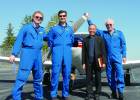

Stuart Hirsch remembers vividly the first time he sensed that airplanes might be used to help injured people.
He was only 3—a child with a good memory—and lived on the grounds of the local airport in Monticello. His father was a commercial pilot and flight instructor, and his mother was a nurse at a local hospital.
“It was 1968,” said Hirsch, who is now the director of music and a Parish Council member at St. Peter’s in Monticello. “My father was working on an airport project to promote one of the earliest air ambulatory services. They were doing a photo shoot and they needed a child, so they strapped me onto a stretcher, attached an IV, loaded me into the aircraft and took pictures.”
With his mother at his side, “I made the connection right then and there that planes could be used to save lives,” he said.
Forty-three years later, Hirsch—registered nurse, pilot and fight instructor—is taking the concept to Haiti. Along with other Catholic friends, he has founded a nonprofit organization called Archangel Airborne, whose first long-term mission is to fly medical professionals, advisers and supplies into that beleaguered nation.
Hirsch, who now serves as administrative director of emergency services for the Health Alliance in Kingston, first went to Haiti in 1992 when he was a student with the Jesuits. “I saw poverty I’d never experienced in my life,” he said.
A little more than a year after the massive earthquake of Jan. 12, 2010, Haiti’s people are still homeless, living largely in tent “cities” where raw sewage runs in the streets. Families die of cholera, making Haiti number one in the world for its death rate of 32 deaths per 1,000 people. In the U.S., the death rate is 8 per 1,000.
Post-earthquake, life expectancy in Haiti is a shocking 29 years.
“Haiti is the poorest country in the Western Hemisphere,” notes Michael Lovelace, another St. Peter’s parishioner and member of Archangel, “and it’s just a plane ride from the U.S. coast. The people have nothing. They are in dire need.”
Lovelace owns TML Aircraft near Honesdale, Pa., which is just over the New York border from his home in Sullivan County. The group is using two TML planes for their medical missions.
After flying to Haiti in May to meet with officials, the group “adopted” Immaculate Conception Hospital in the southwestern city of Les Cayes on their next flight, which took place in August.
“We are one of the few air medical teams under Catholic leadership, and we saw that Immaculate Conception was completely without aid,” Hirsch said.
When the Archangel team visited the hospital, they found only one overworked intern serving hordes of patients. Patients lay untreated on cots. One victim of a motorbike accident was slowly dying, his brain swollen from untreated head trauma. There were no antibiotics, pain medication or insulin. There were none of the sanitary necessities: no gloves, no sterilizers, and the hospital operated without running water.
On its missions—a third is planned for late April or May this year — Archangel doctors and nurses treat patients in the hospital’s emergency room and deliver medical supplies from AmeriCares, a program that offers free medicines to nonprofit groups working in poor areas.
But the team is going well beyond the occasional trip with personnel and supplies.
“We are developing an education component,” said Archangel volunteer David Zwart, who is a paid emergency medical technician in his professional life. He grew up in Sacred Heart parish in Yonkers and now lives in Woodbourne. “We are developing first aid tutorials” for Haitians, who have little knowledge of basic medical care in emergencies, he said.
Hirsch noted that Archangel is also setting up a model of care for Haiti that links U.S. clinics with clinics in Haiti via the Internet. And they are seeking the services of 300 medical personnel who will volunteer one week each year to serve in Haiti and other needy areas around the globe.
All this takes money, and the all-volunteer group raises funds by speaking to civic organizations and by hosting concerts of inspirational music written by Hirsch.
“Archangel Airborne comes strongly out of our faith background and the call to action,” he said.
Their commitment has not gone unnoticed in a country that receives aid from various sources but usually in the form of quick fixes only. When the Archangel team returned to Haiti on its second mission, the Les Cayes Minister of Health enthused, “You’re back! You guys are the first ones to come back!”
Information on Archangel Airborne: www.archangelairborne.org.